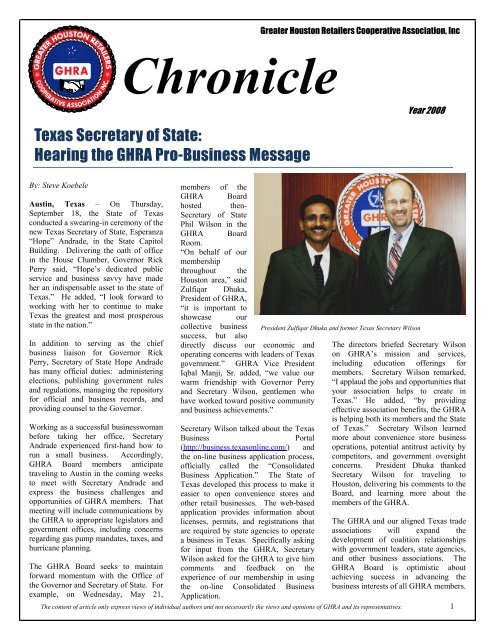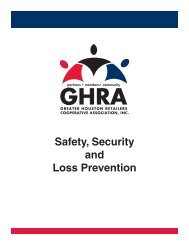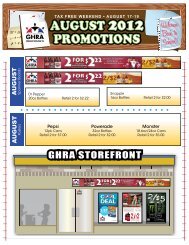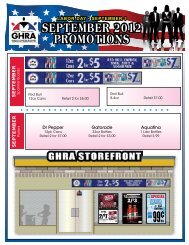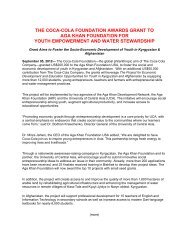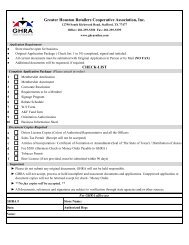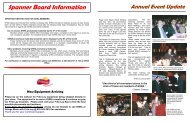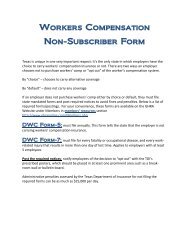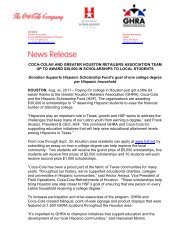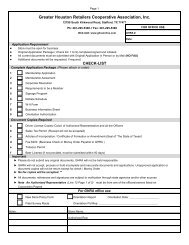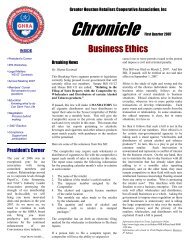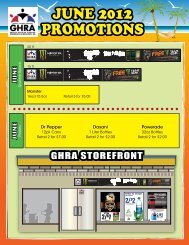2008 - Greater Houston Retailers Cooperative Association, Inc.
2008 - Greater Houston Retailers Cooperative Association, Inc.
2008 - Greater Houston Retailers Cooperative Association, Inc.
You also want an ePaper? Increase the reach of your titles
YUMPU automatically turns print PDFs into web optimized ePapers that Google loves.
<strong>Greater</strong> <strong>Houston</strong> <strong>Retailers</strong> <strong>Cooperative</strong> <strong>Association</strong>, <strong>Inc</strong><br />
Chronicle<br />
Texas Secretary of State:<br />
Hearing the GHRA Pro-Business Message<br />
Year <strong>2008</strong><br />
By: Steve Koebele<br />
Austin, Texas – On Thursday,<br />
September 18, the State of Texas<br />
conducted a swearing-in ceremony of the<br />
new Texas Secretary of State, Esperanza<br />
“Hope” Andrade, in the State Capitol<br />
Building. Delivering the oath of office<br />
in the House Chamber, Governor Rick<br />
Perry said, “Hope’s dedicated public<br />
service and business savvy have made<br />
her an indispensable asset to the state of<br />
Texas.” He added, “I look forward to<br />
working with her to continue to make<br />
Texas the greatest and most prosperous<br />
state in the nation.”<br />
In addition to serving as the chief<br />
business liaison for Governor Rick<br />
Perry, Secretary of State Hope Andrade<br />
has many official duties: administering<br />
elections, publishing government rules<br />
and regulations, managing the repository<br />
for official and business records, and<br />
providing counsel to the Governor.<br />
Working as a successful businesswoman<br />
before taking her office, Secretary<br />
Andrade experienced first-hand how to<br />
run a small business. Accordingly,<br />
GHRA Board members anticipate<br />
traveling to Austin in the coming weeks<br />
to meet with Secretary Andrade and<br />
express the business challenges and<br />
opportunities of GHRA members. That<br />
meeting will include communications by<br />
the GHRA to appropriate legislators and<br />
government offices, including concerns<br />
regarding gas pump mandates, taxes, and<br />
hurricane planning.<br />
members of the<br />
GHRA Board<br />
hosted then-<br />
Secretary of State<br />
Phil Wilson in the<br />
GHRA Board<br />
Room.<br />
“On behalf of our<br />
membership<br />
throughout the<br />
<strong>Houston</strong> area,” said<br />
Zulfiqar Dhuka,<br />
President of GHRA,<br />
“it is important to<br />
showcase our<br />
collective business President Zulfiqar Dhuka and former Texas Secretary Wilson<br />
success, but also<br />
directly discuss our economic and<br />
operating concerns with leaders of Texas<br />
government.” GHRA Vice President<br />
Iqbal Manji, Sr. added, “we value our<br />
warm friendship with Governor Perry<br />
and Secretary Wilson, gentlemen who<br />
have worked toward positive community<br />
and business achievements.”<br />
Secretary Wilson talked about the Texas<br />
Business<br />
Portal<br />
(http://business.texasonline.com/) and<br />
the on-line business application process,<br />
officially called the “Consolidated<br />
Business Application.” The State of<br />
Texas developed this process to make it<br />
easier to open convenience stores and<br />
other retail businesses. The web-based<br />
application provides information about<br />
licenses, permits, and registrations that<br />
are required by state agencies to operate<br />
a business in Texas. Specifically asking<br />
for input from the GHRA, Secretary<br />
Wilson asked for the GHRA to give him<br />
comments and feedback on the<br />
experience of our membership in using<br />
the on-line Consolidated Business<br />
The directors briefed Secretary Wilson<br />
on GHRA’s mission and services,<br />
including education offerings for<br />
members. Secretary Wilson remarked,<br />
“I applaud the jobs and opportunities that<br />
your association helps to create in<br />
Texas.” He added, “by providing<br />
effective association benefits, the GHRA<br />
is helping both its members and the State<br />
of Texas.” Secretary Wilson learned<br />
more about convenience store business<br />
operations, potential antitrust activity by<br />
competitors, and government oversight<br />
concerns. President Dhuka thanked<br />
Secretary Wilson for traveling to<br />
<strong>Houston</strong>, delivering his comments to the<br />
Board, and learning more about the<br />
members of the GHRA.<br />
The GHRA and our aligned Texas trade<br />
associations will expand the<br />
development of coalition relationships<br />
with government leaders, state agencies,<br />
and other business associations. The<br />
GHRA Board is optimistic about<br />
achieving success in advancing the<br />
business interests of all GHRA members.<br />
The GHRA Board seeks to maintain<br />
forward momentum with the Office of<br />
the Governor and Secretary of State. For<br />
example, on Wednesday, May 21, Application.<br />
The content of article only express views of individual authors and not necessarily the views and opinions of GHRA and its representatives. 1
Annual General<br />
Body Meeting <strong>2008</strong><br />
By: Irfan Patel<br />
The year 2007 was another productive<br />
year for the <strong>Greater</strong> <strong>Houston</strong> <strong>Retailers</strong>’<br />
<strong>Cooperative</strong> <strong>Association</strong>, <strong>Inc</strong>. As<br />
required by the By-laws of a cooperative<br />
association, an annual general body<br />
meeting was held on March 11, <strong>2008</strong>. In<br />
light of this meeting, several events took<br />
place, the most important being the<br />
presentation of the financial statements<br />
by the treasurer. The meeting was<br />
attended by 371 member-store<br />
representatives, in the presence of the<br />
Election Committee for GHRA: Mrs.<br />
Shenila Momin, Chairperson, Mr.<br />
Zulfiqar Umetiya, and Mr. Shoukat<br />
Mohammed. In connection, a few<br />
members of the Independent Financial<br />
Committee for GHRA, and Dr. Amirali<br />
Popatia of the Southwest Council of the<br />
Untied States were also present. In this<br />
article, the flow of the meeting will be<br />
explained.<br />
The meeting started with the National<br />
Anthem and then a welcome address by<br />
the President: Karim Dhukani, in which<br />
he touched on several issues. The<br />
president highlighted the strengths of the<br />
association and its initiatives and<br />
endeavors, which included safety<br />
measures programs, captive insurance<br />
initiatives, branding programs and<br />
advertisement/marketing revenue<br />
initiatives. In addition, the <strong>Association</strong>’s<br />
support toward initiatives led by the<br />
Left to right: Iqbal Manji, Kaiser Kasimali, Zulfiqar Dhuka, Karim Maknojia, Karim Dhukani,<br />
Aziz Maredia, Nasruddin Ali, Amir Dosani, Shoukatali Marediya, Nizar Mohammed, Akbar R.<br />
Momin and Hamid Gilani<br />
Economic Planning Board, Interfaith<br />
Ministries, Crime Stopper Program, Red<br />
Cross, and City of <strong>Houston</strong> was<br />
acknowledged. In light of the upcoming<br />
expiration of the tenures of the President<br />
and two other directors, the President<br />
concluded his address by highlighting<br />
the core achievements, initiatives, and<br />
outlooks of the association in the year<br />
2007, and from a futuristic viewpoint he<br />
added the new leadership will take<br />
charge even better of all opportunities<br />
and challenges yet to come this way. The<br />
next speaker on stage was the Southwest<br />
Council President-Dr. Amirali Popatia.<br />
Dr. Popatia started his address with a<br />
thank you note to the GHRA for all<br />
efforts for community development. To<br />
explain such efforts, is beyond the scope<br />
of this article.<br />
The next speaker on stage was the<br />
GHRA Treasurer: Akbar R. Momin, who<br />
started his address by acknowledging the<br />
efforts of the Independent Financial<br />
Committee. The Treasurer then,<br />
explained the Balance Sheet and <strong>Inc</strong>ome<br />
Statement for the year 2007. Mrs.<br />
Shenila Momin took the stage and<br />
explained the election results in which it<br />
was declared there were 6 Open Seats: 3<br />
directors elected without contest, and the<br />
other 3 open seats will be filled by the<br />
Board.<br />
The Master of Ceremony and Director:<br />
Kaiser Kasimali, presented growth<br />
statistics of the last few years.<br />
Furthermore, he discussed new products,<br />
services, and programs which are now<br />
being introduced or pursued by the<br />
GHRA. A few of such initiatives are as<br />
follows: Icelandic Glacial Water, Pre<br />
Pro- a transaction processing company,<br />
coffee programs, and branding and<br />
advertisement initiatives. Closing<br />
remarks were finally made by the Senior<br />
Vice-President of the GHRA-Nasruddin<br />
Ali. In connection, the Senior Vice-<br />
President thanked all GHRA members<br />
and staff for their support and hard work.<br />
The meeting ended with a question and<br />
answer session in which members were<br />
allowed to ask questions based on any<br />
GHRA operations which included<br />
vendor issues, rebate issues, and<br />
financial statement clarifications. This<br />
was the flow of the Annual General<br />
Body Meeting <strong>2008</strong>.<br />
In this photo: GHRA Members seen listening to the presentation at the Annual General Body Meeting<br />
The content of article only express views of individual authors and not necessarily the views and opinions of GHRA and its representatives. 2
Opportunities in the<br />
Coffee Industry<br />
By: Kaiser Kasimali,<br />
GHRA Honorary Secretary<br />
It’s breakfast time and I am sipping on<br />
my morning coffee while writing this<br />
article. Coffee is the first thing I drink<br />
when I wake up in the morning, along<br />
with the other 108 million Americans<br />
nationwide (nacsonline). The notion of<br />
the morning cup of coffee has never<br />
really been about “just something that<br />
you drink,” but rather an indication of a<br />
habit for most Americans. For some,<br />
coffee acts as the morning punch to kickstart<br />
your day, while for others it carries<br />
the idea that their cup will aid them in<br />
enhancing work performance for the day.<br />
Along with this, the majority of morning<br />
commuters have the habit of consuming<br />
a breakfast food, like doughnuts for<br />
example, along with their morning cup<br />
to hold their appetites through to<br />
lunchtime. Bottom line for the coffee<br />
consumer is that: We need a betterroasted,<br />
aromatic coffee in the<br />
morning.<br />
According to the National <strong>Association</strong> of<br />
Convenience Stores, roughly 18.3% of<br />
the total cups of coffee purchased for<br />
consumption in the year 2005 were<br />
bought at a convenience store. In 2006<br />
alone, convenience stores sold more than<br />
$5.7 billion in coffee nationwide, which<br />
comes to an average sale of $40,000 per<br />
store (nacsonline). So my question to all<br />
our GHRA member stores is: Are you<br />
selling that much coffee in your<br />
individual stores<br />
The US economy is in a slump and we<br />
have all started to feel the pinch. Even<br />
the Big Coffee Chains are shutting down<br />
stores to make sure that only the stores<br />
that are profitable exist. On one side,<br />
convenience stores have less competition<br />
as far as coffee is concerned, but on the<br />
other side the consumers are spending<br />
less. Consumers are looking for<br />
bargains even when it comes to pricing<br />
good quality coffee. Big fast food chain<br />
stores are now serving coffee at a<br />
competitive price.<br />
Lets convert this economy slump factor<br />
to our advantage and start thinking about<br />
what an individual convenience store can<br />
do to increase their coffee sales. For<br />
starters, we all need to change the coffee<br />
station image at our convenience stores<br />
in order to gain sales from these big<br />
coffee chain stores that are closing<br />
down. It is once again time to think<br />
outside the box to set ourselves apart<br />
from our competitors. These fast-food<br />
chain stores may have burgers to serve in<br />
their menu, but they do not offer<br />
gasoline, a variety of soda pops and the<br />
convenience of making a one-stop-shop<br />
for the basic necessities of life. We are<br />
ahead of the game but let us not give our<br />
competitors a chance to enjoy a bigger<br />
slice of the pie.<br />
We at GHRA have yearly contracts with<br />
a few of the elite coffee vendors. In<br />
working with one of our vendors of your<br />
choice, start the change if you believe<br />
that you can increase coffee sales in your<br />
store. These<br />
vendors will<br />
not only assist<br />
you by<br />
providing good<br />
quality coffee,<br />
but will also<br />
consult with<br />
you in making<br />
sure that you all<br />
can enjoy<br />
loyalty from<br />
our coffee<br />
drinkers. We<br />
need repeat<br />
business and<br />
thus repeat<br />
customers.<br />
And now, as I<br />
finish the last few sips of my morning<br />
coffee, I leave you with this final<br />
thought. We should all believe in selling<br />
a lot more coffee this spring and make<br />
sure to retain the increased customer<br />
base and maintain it for the New Year<br />
and beyond.<br />
nacsonline:<br />
http://www.nacsonline.com/NACS/News/FactShee<br />
ts/Pages/Coffee.aspx<br />
Secure the Future of<br />
Your Family with an<br />
Estate Plan<br />
By: Faisal Kajani, Attorney-At-Law<br />
As a small business owner, your life is<br />
typically full of chaos. Every day is<br />
different and filled with new challenges.<br />
Planning for what will happen to your<br />
family and your business after your<br />
death is probably the last thing on your<br />
mind. However, this is one of the most<br />
important things you can do for your<br />
family.<br />
If you are a small business owner, and<br />
you die, what happens Your failure to<br />
have a proper estate plan in place could<br />
end up destroying much of the hard work<br />
you spent during your lifetime building<br />
your business and your wealth, while<br />
throwing the lives of your loved ones<br />
into turmoil. Without an estate plan, all<br />
sorts of problems can arise upon your<br />
death or incapacitation, including the<br />
following:<br />
• Your business might have to be<br />
shut down if no one knows how<br />
to run it, what to do, who your<br />
important contacts are, what<br />
accounts you have and so forth.<br />
• You will not be able to control<br />
who will inherit your assets.<br />
• You will not be able to control<br />
who should act as a guardian<br />
for your minor children.<br />
• You will not be able to control<br />
who will be making medical<br />
and financial decisions for you<br />
if you are incapacitated.<br />
As a business owner, it is likely that a<br />
significant portion of your wealth<br />
(including your family’s source of<br />
The content of article only express views of individual authors and not necessarily the views and opinions of GHRA and its representatives.<br />
3
income after your death) is tied up in the<br />
family’s business. The success of your<br />
estate plan will depend on a proper<br />
transition of the business to the next<br />
generation or a sale to someone outside<br />
the family for a fair price. Either result<br />
takes years of preparation and planning.<br />
As a result, it is never too early to start<br />
planning for what will happen to your<br />
business and your family when you are<br />
no longer alive.<br />
An estate plan is a plan of action for how<br />
you want your assets distributed and<br />
loved ones cared for should you pass<br />
away. The main parts of your estate plan<br />
include the following:<br />
1. A Will or a Living Trust. In a will<br />
you state who you want to inherit<br />
your assets and name a guardian<br />
to care for your young children<br />
should something happen to you<br />
and the other parent. Also, if you<br />
desire to leave specific assets to<br />
certain individuals or charitable<br />
organizations, you can express<br />
these wishes in a will. If you die<br />
without a will, a court will have to<br />
decide, based on state law, who<br />
will inherit your assets. This could<br />
lead to a result that is contrary to<br />
your wishes and will create<br />
problems and expenses due to<br />
probate laws, state laws, and<br />
court-appointed strangers making<br />
family decisions. A living trust is<br />
a separate entity that you create to<br />
control what happens to your<br />
assets. Since the trust owns your<br />
assets, the probate process can be<br />
avoided upon death.<br />
2. Life Insurance. Not all small<br />
businesses are cash cows. Many<br />
contain no value once the owner<br />
is gone. If this is the case, how<br />
will your family survive One<br />
solution is life insurance. Having<br />
adequate life insurance will<br />
enable your loved ones to have<br />
enough money to buy a home, pay<br />
for a wedding, go to college, and<br />
pay debts.<br />
3. Buy-Sell Agreements. This type<br />
of agreement is especially<br />
necessary when several<br />
people/partners own your<br />
business. Without this type of<br />
agreement, your loved ones may<br />
get stuck owning a business they<br />
don’t want and can’t sell, or your<br />
partners may get stuck with<br />
partners (your family members)<br />
they didn’t expect. This type of<br />
agreement can require that upon<br />
certain conditions (like the death<br />
of a partner/shareholder), the<br />
parties to the agreement must sell<br />
their shares to the other parties at<br />
a fair market price.<br />
4. Health Care Directives; Financial<br />
Power of Attorney. Writing out<br />
your wishes for health care can<br />
protect you if you become unable<br />
to make medical decisions for<br />
yourself. You can also give<br />
someone you trust the power to<br />
make medical decisions for you if<br />
you are unable to do so. Also,<br />
with a power of attorney for<br />
finances, you can give a trusted<br />
individual the authority to handle<br />
your finances and property if you<br />
become incapacitated and unable<br />
to handle your own affairs. This<br />
person will be able to do things<br />
such as manage your assets,<br />
access your records, or pay bills.<br />
5. Minimizing the Estate Tax. One<br />
of the most important parts of the<br />
estate planning process is<br />
minimizing the estate tax hit for<br />
your heirs. This estate tax (also<br />
known as the “death tax”) is<br />
currently as high as 45% and is a<br />
charge levied on the deceased’s<br />
entire estate, regardless of how it<br />
is disbursed. It is a tax imposed on<br />
the transfer of assets, including a<br />
business, from a deceased person<br />
to his or her heirs. While married<br />
individuals are generally allowed<br />
to leave their financial holdings to<br />
their spouse free of estate tax,<br />
when the surviving spouse dies,<br />
his or her heirs could face a huge<br />
tax bill if a properly planned<br />
estate plan is not in place.<br />
6. Gifting. This is a method<br />
available to help you decrease<br />
your tax burden and reduce the<br />
size of your estate. The annual gift<br />
exclusion allows gifts of cash or<br />
assets of up to $12,000 per<br />
person/recipient per year, to be<br />
free of federal gift taxation.<br />
7. Protect Your Children’s Property.<br />
It is a good idea to name an adult<br />
to manage any money and<br />
property your minor children may<br />
inherit from you. This can be the<br />
same person as the personal<br />
guardian you name in your will.<br />
8. File Beneficiary Forms. If you<br />
name a beneficiary for bank<br />
accounts and retirement plans,<br />
these accounts generally become<br />
“payable on death” to your<br />
beneficiary and allows the funds<br />
to skip the probate process. Also,<br />
in almost all states, you can<br />
register your stocks, bonds, or<br />
brokerage accounts to transfer to<br />
your beneficiary upon your death.<br />
9. Succession Plan. As a small<br />
business owner, you will need a<br />
plan in place so that your heirs<br />
know how to either run things<br />
without you or sell the business.<br />
What the business owns, owes,<br />
important contacts, bank account<br />
information, and so forth must be<br />
laid out in a clear manner. If you<br />
want a particular family member<br />
to run or own the business, you<br />
need to discuss this with that<br />
person and teach him or her what<br />
they need to know.<br />
10. Choose Your Executor. Settling<br />
an estate is a complex process that<br />
often spans many months.<br />
Choosing a trustworthy executor<br />
or personal representative who is<br />
knowledgeable and will be<br />
available to settle your estate is<br />
extremely important for you and<br />
for the security of your loved<br />
ones.<br />
11. Store Your Documents. Your<br />
attorney-in-fact and/or your<br />
executor (the person you choose<br />
in your will to administer your<br />
property after you die) will<br />
probably need access to the<br />
following documents:<br />
• Will<br />
• Insurance Policies<br />
• Certificates for Stocks, Bonds,<br />
Annuities<br />
• Information on Bank Accounts,<br />
Mutual Funds, and Safe Deposit<br />
Boxes<br />
• Trusts<br />
The content of article only express views of individual authors and not necessarily the views and opinions of GHRA and its representatives.<br />
4
• Real Estate Deeds<br />
• Information on Retirement Plans<br />
• Information on Debts, Credit<br />
Cards, Mortgages, Loans,<br />
Utilities, Taxes<br />
It is imperative to start your estate<br />
planning early. The later you start<br />
implementing an estate plan, the closer<br />
your estate may come to costly tax<br />
consequences. A qualified estate<br />
planning attorney can help you examine<br />
your estate and determine which<br />
techniques or methods of reducing or<br />
transferring your estate might be helpful<br />
or appropriate to help you meet your<br />
goals.<br />
Faisal Kajani<br />
Kajani and Associates, P.C.<br />
Telephone: (713) 777-7727<br />
10 Ways to Get<br />
Yourself Out Of<br />
Debt<br />
By: Economic Planning Board (EPB),<br />
Southwest Council for USA<br />
Getting out of debt will usually take you<br />
much longer than it took you to get into<br />
it. Stay calm and be patient. You should<br />
review the simple steps below and<br />
contact your local EPB for further<br />
assistance.<br />
1. Be Committed. The first step you<br />
and all decision makers in the<br />
family must take is to make a firm<br />
commitment to get out of debt. If<br />
everyone is on board, recovery<br />
becomes easier and shorter.<br />
2. Track your spending regularly. This<br />
can really help you save money.<br />
Simply record all expenses that you<br />
incur every month. This exercise<br />
will also help you identify areas<br />
where you can cut back.<br />
3. Then, plan to systematically cut<br />
down on your expenses.<br />
a. First review your unnecessary<br />
regular consumption expenses.<br />
Consider simple things first: how<br />
much would you save if you did<br />
not have that extra soda for a<br />
dollar each day Perhaps you<br />
could shift from a monthly to a<br />
daily membership on your health<br />
club. You could consider shifting<br />
your multiple phone plans to a<br />
single plan that includes landlines,<br />
Internet, TV and mobile phones.<br />
Remember: be frugal and prudent,<br />
but do not do it at the cost of your<br />
health or your education.<br />
Everything else should be up for<br />
review.<br />
b. Next review your larger planned<br />
consumption expenditures and see<br />
what can be deferred. Delay<br />
buying the new TV or buy a used<br />
one. Use extra savings to pay off<br />
a car or furniture loan.<br />
c. Third, review your planned<br />
investment expenditures. For<br />
instance, review your insurance.<br />
There may be scope to switch out<br />
of expensive life insurance into<br />
cheaper term-life policies.<br />
by reducing interest rates or<br />
extending the life of the loan to<br />
lower monthly payments.<br />
6. Use only cash for all your daily<br />
expenses including food, groceries,<br />
and gas. Not only will this serve as a<br />
physical reminder of the money you<br />
have left for the month, but will also<br />
help you think twice before<br />
spending.<br />
7. Consider ways to increase your<br />
income. Perhaps someone in the<br />
family can take a second job or ask<br />
for more hours at work.<br />
8. Prioritize Debt. The financial rule is<br />
to pay off debts with the highest<br />
interest rates first then work down<br />
but some experts say it is best to<br />
tackle debts one at a time and pay<br />
off the ones with the smallest<br />
balances first to give yourself a<br />
sense of accomplishment.<br />
9. Pay yourself first. Before you pay<br />
anyone else set aside 10% of your<br />
net income and put it away in<br />
savings. Then live off the rest. If<br />
you have debt, take this 10% and<br />
pay off your debt.<br />
10. Seek advice from a free debt<br />
counseling service such as National<br />
Debtline or the Consumer Credit<br />
Counseling Service.<br />
Getting out of debt will take you much<br />
longer than it took you to get into it. Stay<br />
calm and be patient. You are not alone.<br />
Millions of people in this country are in<br />
the same boat you are. Follow the simple<br />
steps laid out above and contact your<br />
local EPB for further assistance.<br />
4. Armed with information from the<br />
above steps, it is now time to create<br />
a budget for the family. But do not<br />
make the budget too tight or else no<br />
one will follow it. But do not go<br />
over budget.<br />
5. Finally, refinance your debt. The<br />
ongoing credit crisis is adversely<br />
impacting lending institutions.<br />
Banks would rather charge you less<br />
in interest and fees than have you<br />
default. Most large firms are<br />
working with borrowers to modify<br />
loans to make them more affordable<br />
Coping with the<br />
Economic Downturn<br />
By: Economic Planning Board (EPB,<br />
Southwest Council for USA<br />
The U.S. economy is experiencing a<br />
severe slowdown, resulting from the<br />
slump in housing and the freezing up of<br />
credit markets. It is likely that the current<br />
downturn will be longer than expected,<br />
extending into 2009.<br />
The content of article only express views of individual authors and not necessarily the views and opinions of GHRA and its representatives.<br />
5
Here are some measures you can take to<br />
prepare for the ongoing slowdown:<br />
1. Reduce personal expenses by<br />
cutting back on unnecessary<br />
expenditures, such as on<br />
entertainment and avoid extravagant<br />
living.<br />
2. Keep liquid savings of at least six to<br />
twelve months of living expenses.<br />
This can be achieved by setting<br />
aside a small percentage of your<br />
monthly income in a savings<br />
account.<br />
3. Be proactive, not reactive. For<br />
instance, if you have trouble<br />
meeting mortgage or credit card<br />
payments, contact the bank<br />
immediately.<br />
4. Evaluate what financial risks the<br />
downturn poses for you, determine<br />
in advance how you will tackle<br />
them, and act according to your plan<br />
if problems arise be they job losses,<br />
sharp increases in debt payments or<br />
large declines in business revenues<br />
or stock market investments.<br />
5. Those of you who are in jobs should<br />
make yourselves invaluable at work.<br />
Be willing to take on extra tasks and<br />
complete projects on time. Keep<br />
your resume and your list of<br />
contacts up to date at all times.<br />
Network with those who are in the<br />
same profession to learn about what<br />
opportunities are available. If you<br />
are laid off, file immediately for<br />
unemployment benefits.<br />
6. Use both formal and informal<br />
alliances as a strategy to manage the<br />
downturn. For example, existing<br />
alliances such as trade associations<br />
can be leveraged to jointly negotiate<br />
with vendors to cut inventory costs.<br />
Additionally, employers can<br />
collaborate with their employees to<br />
come up with ways to help improve<br />
sales and save costs.<br />
Finally, reach out to the EPB for advice<br />
and guidance. We have professionals<br />
who can evaluate your situation and help<br />
you identify solutions. Contact the EPB<br />
help desk or council corner for<br />
information.<br />
Remember, slowdowns always open up<br />
opportunities for those well positioned.<br />
Therefore, prepare yourselves to be in a<br />
strong financial condition so that you can<br />
benefit from the opportunities when they<br />
arise and from the upturn when it comes.<br />
TABC Corner<br />
Inspections by TABC Personnel<br />
By: Stephen Jaffe<br />
From time to time a TABC Agent or<br />
TABC Auditor may visit your<br />
establishment for the purpose of<br />
conducting a routine inspection. This<br />
does not mean your personnel have<br />
committed any violations or TABC has<br />
received complaints against your<br />
establishment.<br />
These visits are normally made to help<br />
the establishment comply with the<br />
TABC Code and to provide assistance.<br />
One of the items we check for is the<br />
display of the alcoholic beverage permit<br />
or license as required by TABC Code<br />
Sec. 11.04. The permit or license should<br />
be prominently displayed. Most<br />
permittees and licensees display the<br />
permits and licenses on a wall near the<br />
cashier’s area. This would tell the<br />
general public and most specifically law<br />
enforcement personnel that the<br />
establishment does have a license or<br />
permit to sell alcoholic beverages.<br />
There are several different signs the<br />
TABC Code requires permittees and<br />
licensees to prominently display in their<br />
establishments. They are:<br />
can be easily seen by the public. Near<br />
the front door or cash register is usually<br />
the best location.<br />
Weapons Signs – Section 11.041<br />
requires these signs. These signs are blue<br />
and white. They are meant to notify<br />
someone if they are carrying a weapon<br />
illegally (i.e. handgun without a license<br />
to carry); they could be arrested if law<br />
enforcement personnel catch them. The<br />
blue and white signs are required for<br />
licensees and permittees whose alcoholic<br />
beverage sales are less than 50 % of<br />
gross sales. These signs are available in<br />
English and Spanish.<br />
Health Risks Warning Sign – Section<br />
11.042 requires this sign to be posted on<br />
each restroom door. These signs inform<br />
the public of the risks of consuming<br />
alcoholic beverages during pregnancy.<br />
Previously, all on premises<br />
establishments had received blue and<br />
white warning signs (stickers), which<br />
were to be posted in each restroom.<br />
These stickers have been replaced by a<br />
new sign, which is larger and is in black<br />
and red lettering. The signs contain the<br />
English and Spanish translation. As<br />
noted, the signs should be posted on the<br />
restroom doors.<br />
All of these signs are meant to inform<br />
the public about health and safety issues.<br />
They are available at no charge and may<br />
be obtained at the local TABC office.<br />
Should you have any questions, please<br />
contact The Texas Alcoholic Beverage<br />
Commission at (713) 426-7900.<br />
NATA<br />
NEWS<br />
HOUSTON, TX: OCTOBER <strong>2008</strong><br />
NACS Show <strong>2008</strong> was held in Chicago,<br />
IL from 4 th to 7 th October <strong>2008</strong>. In total<br />
about 62 Directors/Members from<br />
different Trade <strong>Association</strong>s attended the<br />
Show. All these members were offered<br />
Complaint Sign - Section 5.53 and Rule<br />
7. Do not rush into new commitments. 31.4 require this sign. The sign is posted<br />
Be conservative in your approach. to inform the public of their right to discounted registration passes by NACS<br />
Seek professional advice, ensure complain about the sale of alcoholic management. NATA Marketing &<br />
proper contractual compliance and beverages at the establishment. This Promotions Committee members met<br />
always be principled in all your sign is black and white and with many vendors. All these attendees<br />
business dealings.<br />
approximately 6 inches by 3-1/2 inches were invited to dinners by Midwest<br />
and should be place in an area where it Business Alliance, PepsiCo, Frito Lay on<br />
The content of article only express views of individual authors and not necessarily the views and opinions of GHRA and its representatives.<br />
6
different evenings. By attending this<br />
Show, the members developed network<br />
amongst them, attended various relevant<br />
seminars and workshops to the industry<br />
and became abreast with new products<br />
and services.<br />
NATA is pleased to inform all members<br />
that Mr. Aziz Khoja has joined NATA as<br />
its Chief Operating Officer (COO). Mr.<br />
Khoja brings with him vast experience of<br />
working in c-store industries and will<br />
take NATA to its next height.<br />
Gasoline Theft at<br />
Convenience<br />
Stores<br />
When gas prices increase, many gasoline<br />
retailers report an increase in gasoline<br />
theft, or "drive-offs."<br />
While most retailers now require<br />
prepay, gasoline theft is still a $100<br />
million-plus problem.<br />
per gallon profit (at best), a retailer<br />
would need to sell an extra 3,000<br />
gallons to offset each $60 stolen.<br />
• Gasoline theft tends to be a problem<br />
in densely populated metropolitan<br />
areas and near interstates where<br />
there's a greater anonymity; in these<br />
areas, retailers have reported losses<br />
as much as $1,500 per store per<br />
month. At stores in communities,<br />
where everyone tends to know each<br />
other, the problem generally is not<br />
as significant.<br />
• Gasoline theft is not a "Robin Hood"<br />
crime of robbing the rich -- retailers<br />
typically make pennies a gallon on<br />
the sale of gasoline. In fact, they can<br />
often make as much, or more, from<br />
the sale of a 12 oz. cup of coffee<br />
than a 12 gallon fill-up.<br />
• The increase in gasoline theft is<br />
directly related to price increases, as<br />
opposed to high prices. Theft<br />
generally increases every time<br />
prices increase.<br />
We are also proud to report about the<br />
appointment of Mr. Karim W.<br />
Dhukani, the ex President of <strong>Greater</strong> • Gasoline price volatility<br />
<strong>Houston</strong> <strong>Retailers</strong> <strong>Cooperative</strong> traditionally leads to a significant<br />
<strong>Association</strong> (G H R A) as one of the increase in gasoline theft, brought<br />
Board of Directors of National on by misdirected consumer anger at<br />
<strong>Association</strong> of Convenience Stores. Mr. higher prices. However, more<br />
Dhukani will be serving on the NACS retailers now require prepay to stop<br />
Member Services Board Committee<br />
the problem that had gotten out of<br />
control.<br />
Given below is the extract of the Press • Nationwide, in 2007, gasoline theft<br />
Release issued by NACS:<br />
cost the industry $134 million, a<br />
sharp decline from the $300 million<br />
The profile of a typical gasoline<br />
“NACS announced the election of four reported in 2005 and the $237<br />
retail members to serve on its Board of million reported in 2004. (Theft<br />
thief has evolved.<br />
Directors. The new Board members totalled $122 million in 2006.) The<br />
assumed their positions during the average loss per store was slightly • Typically, convenience stores can<br />
NACS Board of Directors meeting on more than $1,000, and that figure is experience a few gasoline thefts a<br />
October 7 during the NACS Show in conservative, since it is based on all week; however, when prices<br />
Chicago. The NACS Show is ranked one convenience stores that sell increase, some stores see several gas<br />
of the 50 largest annual tradeshows in gasoline, including those in states thefts a day. With retailers making a<br />
the United States.<br />
that mandate full-serve (New Jersey penny or two profit on the sale of<br />
and Oregon) and stores in areas gasoline, a retailer needs to sell<br />
where prepay in the norm, such as thousands of additional gallons of<br />
The NACS retail members elected to<br />
serve on the Board of Directors are:<br />
California and many major gasoline just to make up for the loss.<br />
metropolitan areas including New Oftentimes, it only takes one $50<br />
York, Las Vegas, Chicago and theft a day to significantly erode --<br />
• Brad Call, executive of marketing,<br />
Atlanta. There is no way to or wipe out -- a retailer's daily<br />
Maverik <strong>Inc</strong>. (North Salt Lake, UT) determine what the loss was at gasoline profits.<br />
• Karim Dhukani, President and<br />
stores that do not require prepay, but • Gasoline theft has always been an<br />
CEO,W&J Investments <strong>Inc</strong>. (Spring,<br />
the figure is likely double that or issue for the industry, and was often<br />
TX)<br />
more.<br />
teenagers taking a few dollars of<br />
• Fran Duskiewicz, senior executive<br />
• The problem of gasoline theft would gasoline for a thrill. Today, the<br />
vice president, Nice N Easy Grocery<br />
have been even greater since problem of theft is across all<br />
Shoppes <strong>Inc</strong>. (Canastota, NY)<br />
September 2005 if so many retailers demographics, and the cars involved<br />
• Warren Wilmot, CEO, 7-Eleven<br />
hadn't begun to mandate prepay in with the crime are everything from<br />
Stores Pty. Ltd. (Mt. Waverly,<br />
after Hurricane Katrina when "junkers" to late-model SUVs.<br />
Victoria, Australia) “<br />
gasoline prices reached record levels • Just as the frequency of gasoline<br />
of $3.06 per gallon, and when theft increases, so does the size of<br />
The Executive Committee and Board of gasoline prices again topped $3 per the fill-up stolen. And with higher<br />
Directors of NATA extend their heartiest gallon in every year since then.<br />
prices, the amount lost from just one<br />
congratulations to Mr. Karim Dhukani • With convenience stores reporting gasoline theft can easily top $100<br />
and wish him every success in his future total motor fuels sales of $408.9 when an SUV in involved.<br />
endeavors.<br />
billion in 2007, that means that, on • A disturbing trend over the past few<br />
average, one in every 3,300 fill-ups years is the emergence of gasoline<br />
was gasoline theft. While this is not theft rings, in which specially<br />
a "conga line" of theft, at two cents designed trucks are used to siphon<br />
fuel from stations' underground<br />
The content of article only express views of individual authors and not necessarily the views and opinions of GHRA and its representatives.<br />
7
storage tanks. Members of a theft<br />
ring operating in Florida were<br />
arrested in June 2005 for using<br />
trucks that could siphon upwards of<br />
1,000 gallons of fuel undetected.<br />
Also in June 2005, a man in<br />
Cottondale, AL, was severely<br />
burned in an explosion while<br />
allegedly trying to siphon hundreds<br />
of gallons of fuel from a station.<br />
The problem of gasoline theft can<br />
be addressed by mandating<br />
prepay -- but it comes at a cost.<br />
• Requiring customers to prepay for<br />
their fuel would virtually eliminate<br />
the problem of gasoline theft.<br />
However, consumers, wanting<br />
convenience, will usually choose to<br />
go to another retailer that does not<br />
require prepay if one is close. Even<br />
so, the problem of gasoline theft in<br />
2006 led to a record number of<br />
retailers mandating that customers<br />
prepay for their fuel.<br />
• The town of Mt. Pleasant, SC (a<br />
suburb of Charleston), enacted an<br />
ordinance in early 2004 that<br />
mandates that all retailers require<br />
prepay. Similar laws have since<br />
been enacted in Twin Falls, ID (late<br />
2004), Myrtle Beach, SC (July<br />
2005), Bowling Green, KY (January<br />
2006), Kansas City, MO (July 2006)<br />
and Flower Mound, TX (Oct. 2006).<br />
These are believed to be the only<br />
laws of their kind in the United<br />
States, although in some areas of the<br />
country prepay is the norm,<br />
especially California. Other areas of<br />
the country have looked at<br />
mandating prepay, including<br />
Conway, AR; Fayetteville, NC;<br />
Topeka, KS and Milwaukee. In<br />
February <strong>2008</strong>, British Columbia<br />
became the first – and only –<br />
Canadian province to enact such<br />
restrictions.<br />
• Besides the risk of losing customers,<br />
retailers usually elect to require<br />
prepay as a last resort, since<br />
generally customers will<br />
underestimate their gasoline<br />
purchases because they don't want to<br />
have to go back in the store for<br />
change. Also, they tend to shop less<br />
inside the store, where margins are<br />
healthier, because they have already<br />
been inside the store once to prepay<br />
and find going back inside to be<br />
inconvenient. There also are<br />
concerns that mandating prepay<br />
could lead to cash customers instead<br />
paying by credit card at the pump to<br />
avoid the inconvenience of prepay.<br />
Since credit card fees are 2.5 to 3<br />
percent, that means that retailers<br />
could incur an additional 7 to<br />
9 cents per gallon in fees when<br />
gasoline is $3.00 per gallon.<br />
• Usually, retailers will look at<br />
requiring prepay for certain pumps<br />
or certain hours before requiring it<br />
all the time at a store.<br />
Gasoline theft makes a bad<br />
situation worse for retailers.<br />
• <strong>Retailers</strong> are being hit hard by the<br />
higher gasoline prices. During<br />
periods of price increases, retailers'<br />
wholesale costs rise faster than they<br />
can recover them at the pump so<br />
profit margins are down<br />
significantly. NACS reports that<br />
gasoline margins in 2007 were 5.2<br />
percent, the lowest level since 1983,<br />
and much of the reason for declining<br />
fuel margins is price volatility for<br />
gasoline.<br />
• Because theft is typically linked to<br />
elevated prices, gasoline theft<br />
usually hits retailers when the value<br />
of that stolen property is at an alltime<br />
high.<br />
• In addition to reduced profit margins<br />
on gasoline, more customers pay for<br />
their gasoline by credit card<br />
(approximately 60 to 70 percent of<br />
gasoline customers in 2007). The<br />
processing fees for credit cards (as<br />
much as 3 percent) further shrink<br />
already reduced margins to the point<br />
where retailers often make less per<br />
gallon than the credit card<br />
company.<br />
Gasoline theft also negatively<br />
impacts consumers.<br />
• Law-abiding customers must pay<br />
the cost of the theft in higher prices.<br />
• Some drive-offs leave the gas island<br />
at unsafe speeds to avoid being<br />
caught, creating a more dangerous<br />
environment.<br />
• An increase in the incidence of<br />
gasoline theft makes more retailers<br />
consider mandating prepay, which<br />
consumers do not prefer to have as<br />
their only option. If more areas<br />
mandate prepay, it will be one less<br />
product available to consumers on<br />
the "honor system" where they can<br />
obtain a product before they pay for<br />
it.<br />
What do stores do to stop gasoline<br />
theft Technology may play a role.<br />
• Low-tech solutions can be effective.<br />
Simply greeting all customers --<br />
whether by intercom or in person --<br />
can be effective. This takes away the<br />
feeling of anonymity.<br />
• Technologies like the patented<br />
program developed by Pump-on<br />
LLC largely protect the customer's<br />
convenience and still ensures that<br />
theft is eliminated. With this<br />
program, cash customers use their<br />
driver's licenses (where basic<br />
identification information is read) at<br />
the pump to authorize dispensing.<br />
As of January 2007, a number of<br />
retailers have committed to work to<br />
further develop this program,<br />
including Sheetz, Wawa, RaceTrac<br />
and QuikTrip. In fact, QuikTrip has<br />
been using this type of program to<br />
great success in a number of cities.<br />
If customers fill up and fail to pay,<br />
their names are turned over to<br />
police. In Tulsa and Kansas City,<br />
gasoline theft was "reduced to a<br />
trickle," QuikTrip reports.<br />
www.nacsonline.com<br />
Posted: April 1, <strong>2008</strong><br />
Updated: April 30, <strong>2008</strong> 21:51 EST<br />
MEMBERS<br />
CORNER<br />
"What’s on your<br />
mind”<br />
ASK GHRA Board of<br />
Directors. We will<br />
publish answers to all<br />
members’ questions<br />
here in this SECTION.<br />
The content of article only express views of individual authors and not necessarily the views and opinions of GHRA and its representatives.<br />
8
Coffee Corner<br />
An industry update provided by: Global<br />
Coffee Company<br />
Profits from coffee sales continue to<br />
increase as the coffee culture grows<br />
throughout the U.S. In the prior year, the<br />
coffee market was valued at $44 billion<br />
and surpassed the soft drink industry for<br />
the first time as the most popular<br />
beverage after water. Based on a recent<br />
study, the coffee market will grow to an<br />
estimated $59 billion by 2012. The most<br />
recent industry reports note the<br />
following:<br />
‣ Americans consume 400 million cups<br />
of coffee per day making the United<br />
States the leading consumer of coffee<br />
in the world.<br />
‣ Over 50% of Americans over 18 years<br />
of age drink coffee every day. This<br />
represents over 150 million daily<br />
drinkers.<br />
‣ 30 million American adults drink<br />
specialty coffee beverages daily, which<br />
includes cappuccino and frozen/iced<br />
coffee beverages.<br />
‣ 65% of all coffee is consumed during<br />
breakfast hours, 30% between meals,<br />
and the remaining 5% with other<br />
meals.<br />
‣ Among coffee drinkers, the average<br />
consumption in the United States is 3.2<br />
cups of coffee per day.<br />
‣ Daily coffee drinking has increased<br />
for the 4 th consecutive year<br />
Providing a strong coffee program is a<br />
key success factor, as it enables a<br />
business to capitalize on the huge<br />
consumer demand for high quality<br />
regular and specialty coffee. Every<br />
business has the opportunity to profit<br />
from people’s love of coffee by<br />
providing a satisfying brew at a<br />
welcoming coffee station. According to<br />
the National Coffee <strong>Association</strong>, a<br />
convenience store is the ideal stop for<br />
coffee drinkers. These are several<br />
reasons for this:<br />
‣ Approximately 17% of consumers<br />
purchase coffee at a convenience store<br />
‣ 99% of convenience store customers<br />
purchase coffee at a convenience store<br />
over any other retail format<br />
‣ The number one item purchased with<br />
coffee in a convenience store is a<br />
packaged sweet snack, such as donuts,<br />
snack cakes, muffins, and pastries<br />
To satisfy each coffee drinker and<br />
increase repeat purchases, our team has<br />
identified the critical components of a<br />
successful coffee program:<br />
THE BREW. Freshness is key to having<br />
a quality coffee product. It is essential to<br />
work with a coffee supplier who can<br />
provide you the freshest roasted<br />
products, which are sustained by proper<br />
vacuum-sealing.<br />
AVAILABILITY. Coffee is not just a<br />
morning beverage anymore. Always<br />
have fresh coffee readily available for a<br />
quick, convenient pick up at any time of<br />
the day.<br />
THE LOOK. Marketing your coffee<br />
through appealing, clean, and organized<br />
coffee stations will increase your<br />
competitive advantage. If it looks good,<br />
the coffee will taste that much better to<br />
your buyer!<br />
EMPLOYEE TRAINING. It is<br />
essential that your store employees know<br />
how to brew the proper amount of<br />
coffee. Ask your coffee supplier for tips<br />
on how to brew the best coffee. Also<br />
have employee learn how to successfully<br />
cross-sell. For example, have your<br />
employee ask, “Would you like coffee<br />
with that muffin” A little<br />
encouragement always helps!<br />
Coffee is one of America’s favorite<br />
drinks. Therefore it is essential that<br />
every seller have a strong and<br />
competitive coffee program.<br />
At Global Coffee Company, it is our<br />
goal to provide our customers with the<br />
best and most competitive coffee<br />
programs.<br />
Find a customized coffee solution that<br />
works best for your business; the results<br />
will be well worth it!<br />
Visit www.GlobalCoffeeCompany.com<br />
today to learn more.<br />
**Source: The Learning Exchange,<br />
Willard Bishop Consulting<br />
The following is a paid advertisement<br />
The content of article only express views of individual authors and not necessarily the views and opinions of GHRA and its representatives.<br />
9
The following is a paid advertisement<br />
The content of article only express views of individual authors and not necessarily the views and opinions of GHRA and its representatives. 10
The following is a paid advertisement<br />
The content of article only express views of individual authors and not necessarily the views and opinions of GHRA and its representatives. 11
<strong>Greater</strong> <strong>Houston</strong> <strong>Retailers</strong> <strong>Cooperative</strong> <strong>Association</strong>, <strong>Inc</strong>.<br />
The following is a paid advertisement<br />
13003 Southwest Freeway, Suite 150<br />
Stafford, TX 77477<br />
Office Hours: Monday-Friday 9:00am to 5:00pm<br />
Phone: 281-295-5300 Fax: 281-295-5399<br />
E-mail: info@ghraonline.com<br />
GHRA Chronicle Team<br />
Communication and Publication:<br />
Kaiser Kasimali and Karim Maknojia<br />
Editor:<br />
Romina Mohammed<br />
Writers:<br />
Irfan Patel, Kaiser Kasimali, Steve Koebele, Faisal Kajani,<br />
Design, Layout & Printing<br />
Romina Mohammed<br />
Legal Services are now available at GHRA<br />
office<br />
GHRA approved legal consultants will be available to<br />
assist GHRA members with any legal matters. The<br />
consultation will be for general legal advice given to a<br />
GHRA member in one setting relating to TABC,<br />
Immigration and business transaction. Members are<br />
requested call GHRA office to schedule an appointment<br />
to seek any legal advice.<br />
Consultation service fee is $25 per consultation.<br />
The following is a paid advertisement<br />
PROTECT YOURSELF AND YOUR ASSETS WITH<br />
PRASLA INSURANCE AGENCY<br />
Call 281-295-5380<br />
Moiz Merchant<br />
We can handle all your personal and commercial insurance needs. We can write following coverage:<br />
• Auto Insurance<br />
• Home Insurance<br />
• General Liability<br />
• Property<br />
• Workers Compensation<br />
• Pollution Liability<br />
• Professional Liability<br />
• Liquor Liability<br />
• Commercial Crime<br />
• Bonds<br />
• Flood<br />
• Equipment Breakdown<br />
Conveniently located inside GHRA office<br />
The content of article only express views of individual authors and not necessarily the views and opinions of GHRA and its representatives. 12


